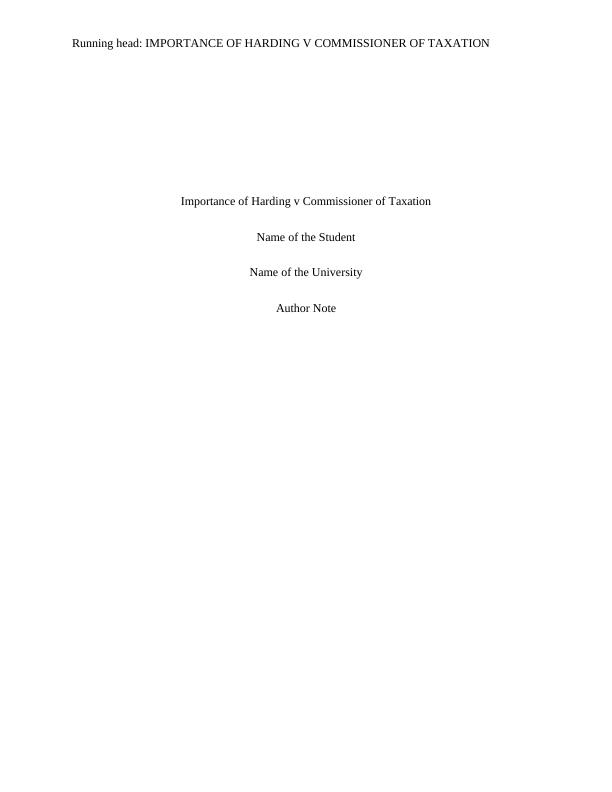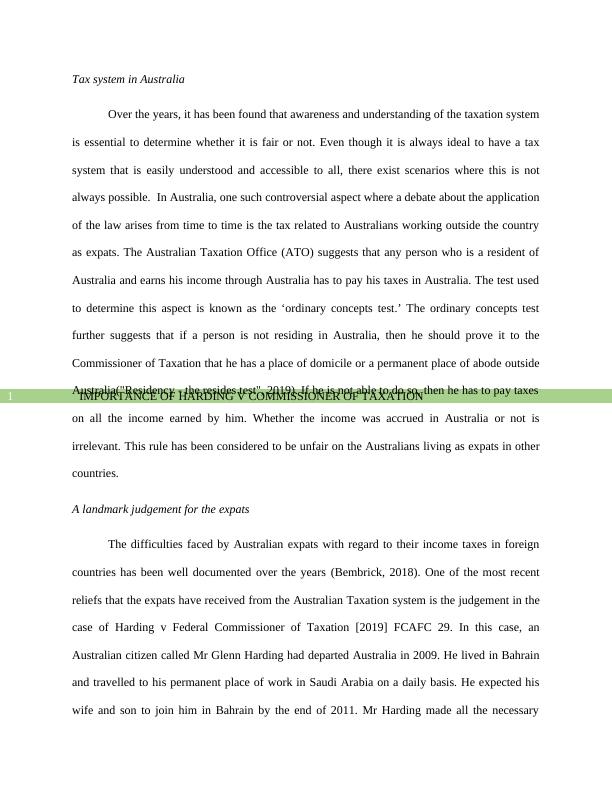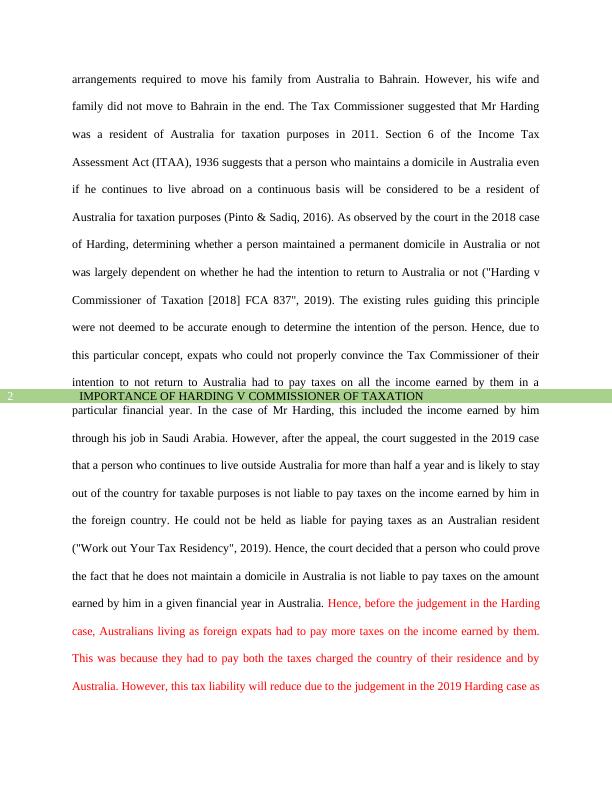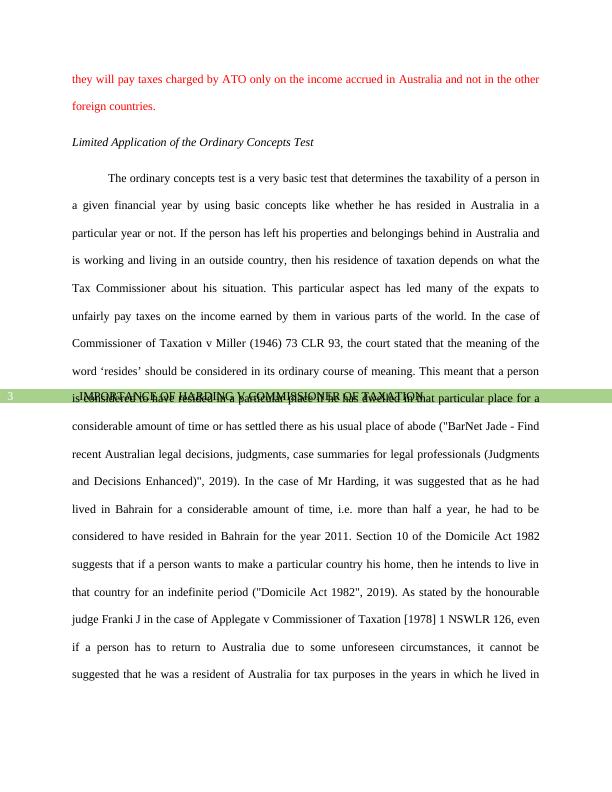Importance of Harding V Commissioner of Taxation.
Discuss the implications of the judgements in Harding v Commissioner of Taxation [2018] FCA 837 and Harding v Federal Commissioner of Taxation [2019] FCAFC 29 in essay style.
13 Pages2769 Words15 Views
Added on 2022-09-17
Importance of Harding V Commissioner of Taxation.
Discuss the implications of the judgements in Harding v Commissioner of Taxation [2018] FCA 837 and Harding v Federal Commissioner of Taxation [2019] FCAFC 29 in essay style.
Added on 2022-09-17
ShareRelated Documents
Running head: IMPORTANCE OF HARDING V COMMISSIONER OF TAXATION
Importance of Harding v Commissioner of Taxation
Name of the Student
Name of the University
Author Note
Importance of Harding v Commissioner of Taxation
Name of the Student
Name of the University
Author Note

IMPORTANCE OF HARDING V COMMISSIONER OF TAXATION1
Tax system in Australia
Over the years, it has been found that awareness and understanding of the taxation system
is essential to determine whether it is fair or not. Even though it is always ideal to have a tax
system that is easily understood and accessible to all, there exist scenarios where this is not
always possible. In Australia, one such controversial aspect where a debate about the application
of the law arises from time to time is the tax related to Australians working outside the country
as expats. The Australian Taxation Office (ATO) suggests that any person who is a resident of
Australia and earns his income through Australia has to pay his taxes in Australia. The test used
to determine this aspect is known as the ‘ordinary concepts test.’ The ordinary concepts test
further suggests that if a person is not residing in Australia, then he should prove it to the
Commissioner of Taxation that he has a place of domicile or a permanent place of abode outside
Australia("Residency - the resides test", 2019). If he is not able to do so, then he has to pay taxes
on all the income earned by him. Whether the income was accrued in Australia or not is
irrelevant. This rule has been considered to be unfair on the Australians living as expats in other
countries.
A landmark judgement for the expats
The difficulties faced by Australian expats with regard to their income taxes in foreign
countries has been well documented over the years (Bembrick, 2018). One of the most recent
reliefs that the expats have received from the Australian Taxation system is the judgement in the
case of Harding v Federal Commissioner of Taxation [2019] FCAFC 29. In this case, an
Australian citizen called Mr Glenn Harding had departed Australia in 2009. He lived in Bahrain
and travelled to his permanent place of work in Saudi Arabia on a daily basis. He expected his
wife and son to join him in Bahrain by the end of 2011. Mr Harding made all the necessary
Tax system in Australia
Over the years, it has been found that awareness and understanding of the taxation system
is essential to determine whether it is fair or not. Even though it is always ideal to have a tax
system that is easily understood and accessible to all, there exist scenarios where this is not
always possible. In Australia, one such controversial aspect where a debate about the application
of the law arises from time to time is the tax related to Australians working outside the country
as expats. The Australian Taxation Office (ATO) suggests that any person who is a resident of
Australia and earns his income through Australia has to pay his taxes in Australia. The test used
to determine this aspect is known as the ‘ordinary concepts test.’ The ordinary concepts test
further suggests that if a person is not residing in Australia, then he should prove it to the
Commissioner of Taxation that he has a place of domicile or a permanent place of abode outside
Australia("Residency - the resides test", 2019). If he is not able to do so, then he has to pay taxes
on all the income earned by him. Whether the income was accrued in Australia or not is
irrelevant. This rule has been considered to be unfair on the Australians living as expats in other
countries.
A landmark judgement for the expats
The difficulties faced by Australian expats with regard to their income taxes in foreign
countries has been well documented over the years (Bembrick, 2018). One of the most recent
reliefs that the expats have received from the Australian Taxation system is the judgement in the
case of Harding v Federal Commissioner of Taxation [2019] FCAFC 29. In this case, an
Australian citizen called Mr Glenn Harding had departed Australia in 2009. He lived in Bahrain
and travelled to his permanent place of work in Saudi Arabia on a daily basis. He expected his
wife and son to join him in Bahrain by the end of 2011. Mr Harding made all the necessary

IMPORTANCE OF HARDING V COMMISSIONER OF TAXATION2
arrangements required to move his family from Australia to Bahrain. However, his wife and
family did not move to Bahrain in the end. The Tax Commissioner suggested that Mr Harding
was a resident of Australia for taxation purposes in 2011. Section 6 of the Income Tax
Assessment Act (ITAA), 1936 suggests that a person who maintains a domicile in Australia even
if he continues to live abroad on a continuous basis will be considered to be a resident of
Australia for taxation purposes (Pinto & Sadiq, 2016). As observed by the court in the 2018 case
of Harding, determining whether a person maintained a permanent domicile in Australia or not
was largely dependent on whether he had the intention to return to Australia or not ("Harding v
Commissioner of Taxation [2018] FCA 837", 2019). The existing rules guiding this principle
were not deemed to be accurate enough to determine the intention of the person. Hence, due to
this particular concept, expats who could not properly convince the Tax Commissioner of their
intention to not return to Australia had to pay taxes on all the income earned by them in a
particular financial year. In the case of Mr Harding, this included the income earned by him
through his job in Saudi Arabia. However, after the appeal, the court suggested in the 2019 case
that a person who continues to live outside Australia for more than half a year and is likely to stay
out of the country for taxable purposes is not liable to pay taxes on the income earned by him in
the foreign country. He could not be held as liable for paying taxes as an Australian resident
("Work out Your Tax Residency", 2019). Hence, the court decided that a person who could prove
the fact that he does not maintain a domicile in Australia is not liable to pay taxes on the amount
earned by him in a given financial year in Australia. Hence, before the judgement in the Harding
case, Australians living as foreign expats had to pay more taxes on the income earned by them.
This was because they had to pay both the taxes charged the country of their residence and by
Australia. However, this tax liability will reduce due to the judgement in the 2019 Harding case as
arrangements required to move his family from Australia to Bahrain. However, his wife and
family did not move to Bahrain in the end. The Tax Commissioner suggested that Mr Harding
was a resident of Australia for taxation purposes in 2011. Section 6 of the Income Tax
Assessment Act (ITAA), 1936 suggests that a person who maintains a domicile in Australia even
if he continues to live abroad on a continuous basis will be considered to be a resident of
Australia for taxation purposes (Pinto & Sadiq, 2016). As observed by the court in the 2018 case
of Harding, determining whether a person maintained a permanent domicile in Australia or not
was largely dependent on whether he had the intention to return to Australia or not ("Harding v
Commissioner of Taxation [2018] FCA 837", 2019). The existing rules guiding this principle
were not deemed to be accurate enough to determine the intention of the person. Hence, due to
this particular concept, expats who could not properly convince the Tax Commissioner of their
intention to not return to Australia had to pay taxes on all the income earned by them in a
particular financial year. In the case of Mr Harding, this included the income earned by him
through his job in Saudi Arabia. However, after the appeal, the court suggested in the 2019 case
that a person who continues to live outside Australia for more than half a year and is likely to stay
out of the country for taxable purposes is not liable to pay taxes on the income earned by him in
the foreign country. He could not be held as liable for paying taxes as an Australian resident
("Work out Your Tax Residency", 2019). Hence, the court decided that a person who could prove
the fact that he does not maintain a domicile in Australia is not liable to pay taxes on the amount
earned by him in a given financial year in Australia. Hence, before the judgement in the Harding
case, Australians living as foreign expats had to pay more taxes on the income earned by them.
This was because they had to pay both the taxes charged the country of their residence and by
Australia. However, this tax liability will reduce due to the judgement in the 2019 Harding case as

IMPORTANCE OF HARDING V COMMISSIONER OF TAXATION3
they will pay taxes charged by ATO only on the income accrued in Australia and not in the other
foreign countries.
Limited Application of the Ordinary Concepts Test
The ordinary concepts test is a very basic test that determines the taxability of a person in
a given financial year by using basic concepts like whether he has resided in Australia in a
particular year or not. If the person has left his properties and belongings behind in Australia and
is working and living in an outside country, then his residence of taxation depends on what the
Tax Commissioner about his situation. This particular aspect has led many of the expats to
unfairly pay taxes on the income earned by them in various parts of the world. In the case of
Commissioner of Taxation v Miller (1946) 73 CLR 93, the court stated that the meaning of the
word ‘resides’ should be considered in its ordinary course of meaning. This meant that a person
is considered to have resided in a particular place if he has dwelled in that particular place for a
considerable amount of time or has settled there as his usual place of abode ("BarNet Jade - Find
recent Australian legal decisions, judgments, case summaries for legal professionals (Judgments
and Decisions Enhanced)", 2019). In the case of Mr Harding, it was suggested that as he had
lived in Bahrain for a considerable amount of time, i.e. more than half a year, he had to be
considered to have resided in Bahrain for the year 2011. Section 10 of the Domicile Act 1982
suggests that if a person wants to make a particular country his home, then he intends to live in
that country for an indefinite period ("Domicile Act 1982", 2019). As stated by the honourable
judge Franki J in the case of Applegate v Commissioner of Taxation [1978] 1 NSWLR 126, even
if a person has to return to Australia due to some unforeseen circumstances, it cannot be
suggested that he was a resident of Australia for tax purposes in the years in which he lived in
they will pay taxes charged by ATO only on the income accrued in Australia and not in the other
foreign countries.
Limited Application of the Ordinary Concepts Test
The ordinary concepts test is a very basic test that determines the taxability of a person in
a given financial year by using basic concepts like whether he has resided in Australia in a
particular year or not. If the person has left his properties and belongings behind in Australia and
is working and living in an outside country, then his residence of taxation depends on what the
Tax Commissioner about his situation. This particular aspect has led many of the expats to
unfairly pay taxes on the income earned by them in various parts of the world. In the case of
Commissioner of Taxation v Miller (1946) 73 CLR 93, the court stated that the meaning of the
word ‘resides’ should be considered in its ordinary course of meaning. This meant that a person
is considered to have resided in a particular place if he has dwelled in that particular place for a
considerable amount of time or has settled there as his usual place of abode ("BarNet Jade - Find
recent Australian legal decisions, judgments, case summaries for legal professionals (Judgments
and Decisions Enhanced)", 2019). In the case of Mr Harding, it was suggested that as he had
lived in Bahrain for a considerable amount of time, i.e. more than half a year, he had to be
considered to have resided in Bahrain for the year 2011. Section 10 of the Domicile Act 1982
suggests that if a person wants to make a particular country his home, then he intends to live in
that country for an indefinite period ("Domicile Act 1982", 2019). As stated by the honourable
judge Franki J in the case of Applegate v Commissioner of Taxation [1978] 1 NSWLR 126, even
if a person has to return to Australia due to some unforeseen circumstances, it cannot be
suggested that he was a resident of Australia for tax purposes in the years in which he lived in

End of preview
Want to access all the pages? Upload your documents or become a member.
Related Documents
Taxation of Australian Expats: Implications of Harding v Commissioner of Taxation | Deskliblg...
|10
|2295
|220
Importance of the Cases of Hardinglg...
|12
|2555
|281
Taxation Lawlg...
|9
|2588
|218
Contents. “Tax implications for Australians who are livlg...
|8
|2815
|1
Implications of Harding v Commissioner of Taxation Assessment 2022lg...
|12
|2539
|31
Analysis of Harding v Commissioner of Taxation | Essaylg...
|12
|2517
|22
